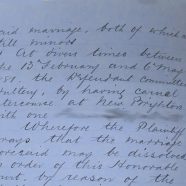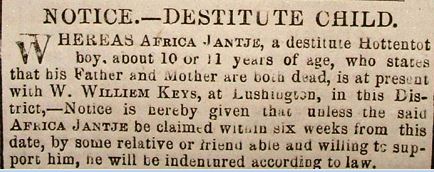
As I trawl through archival material I am constantly struck by the similarities that exist between the present and the past. Individuals have come and gone but the things to which they aspired and the things they got up to back then were, and are, essentially the same. Now I can almost hear you say that things couldn’t possibly have been as frantic and twisted then as they are today. No? Let’s make a few comparisons. Let’s start with families. I have come across many, many cases throughout the 19th Century where families were fragmented by desertion, divorce or death. Sound familiar?
Divorces, especially in the early 1900’s were for the very same reasons we have today: Malicious desertion, physical abuse, intemperate habits, adultery etc. etc. I recently read through a court case which took place in 1893 where a man was convicted of theft for the second time in a year and sentenced to 2 years hard labour on the Breakwater. By trade he was an ironmonger and had a business in Cape Town. He had a wife and three young daughters under the age of 6 years. Sounds like the perfect life, so why would he resort to theft? Like many of our modern day cases, he had a drinking problem and couldn’t hold down a job. He eventually came out of prison and disappeared out of his family’s lives forever. Good riddance you might say, but it wasn’t that simple. Not only did he desert his family but his wife was left without any means of support and she could not remarry as she was still married to him. In the 19th century one did not co-habit so she was left in an awful situation. She made a living teaching and many years later she filed an application to the Supreme Court to grant her a divorce so that she could marry again. She did and enjoyed fourteen happy years before she died in 1927.
Someone Stole My Ride!
The equivalent of motor vehicle theft in the 1800’s was the theft of horses. Instead of reporting make, model and chassis number to the authorities you would report the loss of a “brown mare about 9 years old, white star on forehead, marked right ear swallow tail, left ear slit” and hopefully someone would spot it and tell you where to find it. Of course animals could do something that cars cannot do. They could wander off by themselves and would often end up at the local pound. The Pound Master would then sell your wandering transport if you did not collect it within 6 weeks, after all it didn’t just take up space, it also had to be fed and watered.
Destitute Children
The 1800’s equivalent of street children? The Government Gazettes have hundreds of entries for ‘destitute children’ who, unless claimed were indentured “to some fit and proper person” mostly people with trades or to farmers. In the Government Gazette of 7th April 1876 the following entry appears: ”Wheras Africa Jantje, a destitute Hottentot boy about 10 or 11 years of age, who states that his Father and Mother are both dead, is at present with W Williem Keys, at Lushington in this District, notice is hereby given that unless the said Africa Jantje be claimed within six weeks from this date, by some relative or friend able and willing to support him, he will be indentured according to law. [signed] Alexander Bisset, Resident Magistrate, Seymour, 29th March 1876.” Makes you wonder what became of young Africa. Did anyone come along to claim him? I seriously doubt it. His family, if he had any, would more than likely have been unable to read and if they could, the Government Gazette was not delivered door to door back then (still isn’t for that matter).
Missing Persons
One thing that was easier to achieve back then than it is today, was the ability to just disappear or to change one’s name. The CO or Colonial Office Archive series in the Cape Town Archives has numerous letters from worried relatives in England and elsewhere looking for family members, mostly male, who had left their country of birth to enter the Cape Colony and were never heard of again. Some did it to evade the law, some to evade their spouses or family, others to seek their fortune. The Colonial Office would publish these queries in the Government Gazette and in the 3rd December 1895 edition alone there are 21 missing persons listed. The entries look something like this: “Henry John Palmer – came to the Cape Colony from New Zealand about the year 1868 and supposed to have proceeded to the Diamond Fields.” and “Garlick or Knoblach – came from Germany to Cape Colony a long time ago and is supposed to have been in business in Cape Town on his own account.” Others simply had these meager facts: “George Rodwell last heard of at Cape Town about 12 months ago.”
Changing Names
Name changes must have occurred more often than we think and none of them official. Apart from the usual small changes which took place over time, like Petersen to Peterson, I have tracked some who anglicised their names from Dutch or German. Johan became John, Lourens became Lawrence and Pieter became Peter. Sometimes it was even changed from English to French! The one I came across was quite unusual in that this man changed his first names from William Henry to Henri de Clunison (a play on his original surname) and then added his newly acquired surname. I have still not been able to ascertain why he wanted to change his identity. Just goes to show that you have to try all sorts of variants on the spelling of names when looking for your missing links!
More from the Chronicles of a wandering Genealogist next time (or should that be a wondering genealogist???)





Would like to find my family history and in laws as well